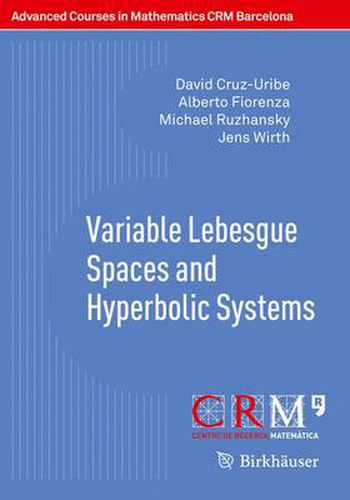Readings Newsletter
Become a Readings Member to make your shopping experience even easier.
Sign in or sign up for free!
You’re not far away from qualifying for FREE standard shipping within Australia
You’ve qualified for FREE standard shipping within Australia
The cart is loading…






This title is printed to order. This book may have been self-published. If so, we cannot guarantee the quality of the content. In the main most books will have gone through the editing process however some may not. We therefore suggest that you be aware of this before ordering this book. If in doubt check either the author or publisher’s details as we are unable to accept any returns unless they are faulty. Please contact us if you have any questions.
This book targets graduate students and researchers who want to learn about Lebesgue spaces and solutions to hyperbolic equations. It is divided into two parts.
Part 1 provides an introduction to the theory of variable Lebesgue spaces: Banach function spaces like the classical Lebesgue spaces but with the constant exponent replaced by an exponent function. These spaces arise naturally from the study of partial differential equations and variational integrals with non-standard growth conditions. They have applications to electrorheological fluids in physics and to image reconstruction. After an introduction that sketches history and motivation, the authors develop the function space properties of variable Lebesgue spaces; proofs are modeled on the classical theory. Subsequently, the Hardy-Littlewood maximal operator is discussed. In the last chapter, other operators from harmonic analysis are considered, such as convolution operators and singular integrals. The text is mostly self-contained, with only some more technical proofs and background material omitted.
Part 2 gives an overview of the asymptotic properties of solutions to hyperbolic equations and systems with time-dependent coefficients. First, an overview of known results is given for general scalar hyperbolic equations of higher order with constant coefficients. Then strongly hyperbolic systems with time-dependent coefficients are considered. A feature of the described approach is that oscillations in coefficients are allowed. Propagators for the Cauchy problems are constructed as oscillatory integrals by working in appropriate time-frequency symbol classes. A number of examples is considered and the sharpness of results is discussed. An exemplary treatment of dissipative terms shows how effective lower order terms can change asymptotic properties and thus complements the exposition.
$9.00 standard shipping within Australia
FREE standard shipping within Australia for orders over $100.00
Express & International shipping calculated at checkout
This title is printed to order. This book may have been self-published. If so, we cannot guarantee the quality of the content. In the main most books will have gone through the editing process however some may not. We therefore suggest that you be aware of this before ordering this book. If in doubt check either the author or publisher’s details as we are unable to accept any returns unless they are faulty. Please contact us if you have any questions.
This book targets graduate students and researchers who want to learn about Lebesgue spaces and solutions to hyperbolic equations. It is divided into two parts.
Part 1 provides an introduction to the theory of variable Lebesgue spaces: Banach function spaces like the classical Lebesgue spaces but with the constant exponent replaced by an exponent function. These spaces arise naturally from the study of partial differential equations and variational integrals with non-standard growth conditions. They have applications to electrorheological fluids in physics and to image reconstruction. After an introduction that sketches history and motivation, the authors develop the function space properties of variable Lebesgue spaces; proofs are modeled on the classical theory. Subsequently, the Hardy-Littlewood maximal operator is discussed. In the last chapter, other operators from harmonic analysis are considered, such as convolution operators and singular integrals. The text is mostly self-contained, with only some more technical proofs and background material omitted.
Part 2 gives an overview of the asymptotic properties of solutions to hyperbolic equations and systems with time-dependent coefficients. First, an overview of known results is given for general scalar hyperbolic equations of higher order with constant coefficients. Then strongly hyperbolic systems with time-dependent coefficients are considered. A feature of the described approach is that oscillations in coefficients are allowed. Propagators for the Cauchy problems are constructed as oscillatory integrals by working in appropriate time-frequency symbol classes. A number of examples is considered and the sharpness of results is discussed. An exemplary treatment of dissipative terms shows how effective lower order terms can change asymptotic properties and thus complements the exposition.